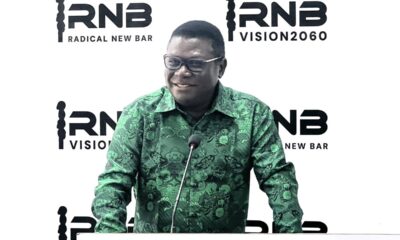Isa Senkumba
The leaders we want and those we need
The Other Side of the Coin
Just two weeks ago my son was sworn in as head prefect of a certain primary school in Kampala after a hotly contested election in which he managed to beat, a request I intentionally turned down.
I advised him to tell the voters that he had come to ask for their mandate to deliver good services to the school community and not to distribute sweets that only melt in just a few minutes in their mouths. This and many other good qualities within him must have won him votes.
Voting is such an important exercise since it enables the electorate to make a decision and express their opinion about the contesting candidates. It also gives the candidates a chance to be evaluated and weighed by the electorate.
By deciding on who should get into power or position of responsibility we are directly participating in determining the direction of the community in which we live. The popular saying that decisions are made by people who turn up implies that absentees don’t decide. In fact bad leaders are voted into power by people who don’t turn up for voting in an election.
The most interesting questions about an election are not concerned with who won but with such questions as why people voted the way that they did or what the implications of the results are. These questions are not always easily answered.
Looking only at the campaign events and incidents will not suffice. The unique aspects of the election must be blended with a more general understanding of electoral behavior to create a full explanation. We thus need to discuss basic concepts and ideas used in the study of voting behavior as a basis for analyzing the election results.
There is always a serious need to know the basis upon which voters decide how they will cast their ballot. Several basic factors can be identified as reasons for choosing a candidate in an election especially a presidential election.
A voter may choose a candidate on the basis of one or more of the following considerations; orientations on specific issues of public policy, general evaluations of the government performance and evaluations of the personal characteristics of the candidates. When voters are asked what they like or dislike about a specific candidate, that’s, what might make them vote for or against that candidate most of their responses fall into one of the above three categories.
It becomes very easy for you to decide upon the best candidate to vote for if you know how to judge them in the first place. Candidates can be judged in two ways: the positions they take on issues and the leadership qualities and experience they would bring to the office. Your first step in picking a candidate is to decide the issues you care about and the qualities you want in a leader.
If you consider issues, think about community or national problems that you want people in government to address. For a multi-party system like in Uganda consider what party the candidate belongs to and the typical stance the party takes on the issues. For example, you may be interested in national security, government funding for student loans or unemployment.
In a democratic setting we can establish the level of maturity of the electorate from the leaders they elect. The electorate that can distinguish between leaders they want and leaders they need has attained a high level of political maturity. In the last Presidential elections (2011) a female market vendor who was a staunch supporter of candidate Yoweri Museveni said, “Museveni ye waffe. Bwo mutunulira talina we yakyama’- literally meaning that she was in for Museveni because he is even handsome. As long as we still judge candidates by their looks we have a long way to go
The dream of every candidate is to win an election. The need to understand the dynamics of winning an election runs around every candidate’s head. In 64 BC when idealist Marcus Cicero, Rome’s greatest orator, ran for consul (the highest office in the Republic), his practical brother Quintus decided he needed some no-nonsense advice on running a successful campaign.
What followed in his short letter are timeless bits of political wisdom, from the importance of promising everything to everybody and reminding voters about the sexual scandals of your opponents to being a chameleon, putting on a good show for the masses, and constantly surrounding yourself with rabid supporters. When Cicero won, this art of personal politicking was adopted and it is still relevant today.
It is also common for incumbents to destroy the voting mood of some of the electorate, especially when they develop perceptions that the election will not be free and fair, the electoral officials will manipulate results, and the incumbent will rig and get back in power and so on.
This cajoles them to peacefully boycott elections and choose to say home yet the supporters of the incumbent are busy voting for their candidate at the polling centres. Basically declining to vote does not throw an incumbent out of power, it only keeps him in power. In boxing you are advised never to allow your opponent to get you crossed with provocative statements because that’s the first decent step towards losing the match.
Comments



















